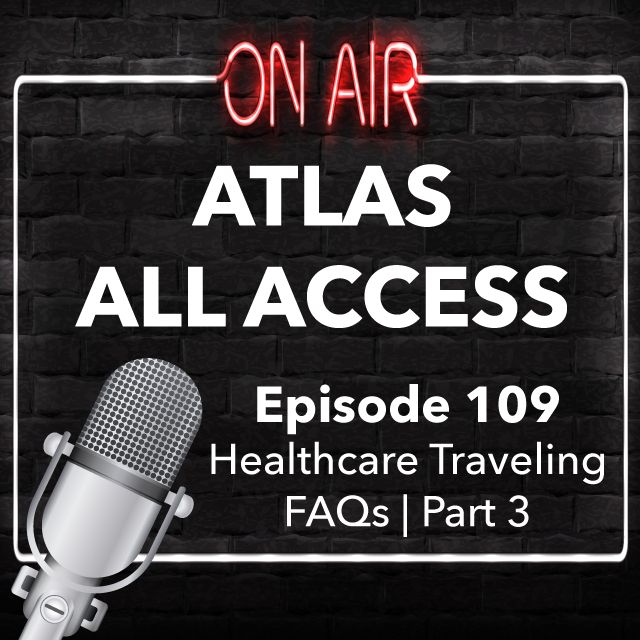
Travel Nurse Questions, Compliance questions answered - Atlas All Access 109
03-05-2020
Compliance can feel extremely complicated, especially if you are a new traveler.
Our experts go through some of the most commonly asked questions that travelers have: new travelers, experienced travelers, even if you have no idea -- we cover all the questions here.
If you are considering becoming a travel nurse, or you feel that wanderlust itch and want to know more about how compliance works for the travel healthcare industry, then this is the place to go.
What will your adventure be?
Rich Smith: Part three of frequently asked questions. On this episode, we tackle the monster that is compliance with the nicest person in compliance- Cassie Walford. Atlas All Access starts now.
Kasandra Wolfert: Hey guys!
Rich Smith: Hi, Cassie. Welcome back. I know maybe you don't always like being here, but you always volunteer or you always say yes when I ask you. And quite honestly you have the best answers. And so that's why I asked you to be in here with us when we talk about compliance.
Kasandra Wolfert: Well thank you.
Rich Smith: So, okay, so we're going to start at the top. These are all questions that our recruiters have given to us that we kind of compiled here on our side that they hear all the time. Not just from new travelers, but from those conversations they have on the phone. It'd be from existing travelers that maybe just don't have all of those answers. So we're going to start at the top here. This is a very broad question, so make it as narrow as you possibly can. How does, how does the compliance process work and when does it start?
Kasandra Wolfert: So it starts on the compliance end once the traveler has signed the work order and then everything the recruiter needs to get over to us gets sent. We have 24 to 48 hours in compliance to get what we call the welcome email out, which we send to the traveler with the list of their requirements. Now I will say the 24 to 48 hour time frame during our busy season, it doesn't always come out within that timeframe. Or if a start is several months out in advance, we wait a little bit to send that.
Rich Smith: Travelers placed, accepts the contract, signs on the dotted line and then it goes to you guys and you have 24 to 48 hours to send that welcome email with that first like, okay, here's everything we need kind of thing.
Kasandra Wolfert: So once they sign the contract and get it over to their recruiter, their recruiter, there's a step their recruiter has to follow to get to compliance before that starts.
Rich Smith: Understood. Okay. And I think that's probably just in place to make sure that everything is done correctly on the recruiter's end before they give it to you. Because any false start on your end would cost everybody else time.
Kasandra Wolfert: Correct.
Rich Smith: Gotcha. Okay. I know this question comes up a lot and this is maybe a loaded question, why is compliance such a big deal?
Kasandra Wolfert: So it's a very loaded question, but to be broad, you know, we go by joint commission, which I don't need to get in to the specifics of what that is.
Rich Smith: We all know what that is.
Kasandra Wolfert: That's not my job in knowing the specifics of joint commission and certification. But compliance is a big deal because we're trying to keep the traveler safe. If something should go wrong, we want to make sure that they're covered, we're covered. And then when we're building relationships. So the compliance portion, we're communicating with all involved- the facilities, the vendors, the recruiters, the travelers. So it's all about building relationships and facilities and hospitals. The compliance is the biggest portion of getting somebody placed.
Rich Smith: And I think that's an interesting point because things have changed over the years so dramatically whereas maybe like the client manager before was kind of that connection to the hospital, that nerve center kind of thing that all the communication happened there. It's now shifted to compliance. We've gotten contracts, Atlas has gotten contracts simply based on the level of compliance that we provide back to the hospitals. Right? Or back to the vendor. The vendor says, okay, this is a very difficult hospital from a compliance standpoint and you're scoring consistently 100% and you're coming in ahead of time and we never have to worry about your compliance. Okay. You can have this contract now. Right? And so that has really changed over the years because one, I think of the level of consistency on, on your end in the compliance department.
Kasandra Wolfert: Yeah, absolutely. And the facilities, when the compliance portion is there, that's the hardest and longest part I think of the whole process. So if that part is run smoothly, we get more contracts, which...
Rich Smith: Faster placements?
Kasandra Wolfert: Yeah. And it just opens up more for our travelers.
Rich Smith: It's path of least resistance for them, right? I mean it comes to whoever is easiest to work with, they're going to work with. And so I think that's, compliance plays a huge role in that, which absolutely is part of the reason why you guys are on the traveler so much, just to make sure you get to sit on time like we have, let's get this in faster and, and do it better than anybody else. So next time around, it's that much easier for the traveler to get a position at this hospital.
Kasandra Wolfert: Absolutely.
Rich Smith: Okay. I just did my company competency exams with another company. Why do I have to go through credentialing all over again just because I switched companies?
Kasandra Wolfert: This is a very common question and it's simply because when you send over as a traveler, when you send over those prophecy or competency exams, we're sending all of those over to the facilities and if it's got a different company's name on it, it looks like we're not doing our due diligence to get the traveler compliant.
Rich Smith: Correct.
Kasandra Wolfert: And we're being lazy.
Rich Smith: Which I get it duplicating work, right?
Kasandra Wolfert: Yep. Absolutely. It's frustrating,
Rich Smith: But it all comes back around to that quality piece.
Rich Smith: Same thing. My health records worked for my last assignment. What's the problem with them now?
Kasandra Wolfert: That's all going to be based on facility requirements. Specific facilities require very detailed information. So something that may have worked at a different facility isn't going to transfer over. All based on what the facility requires.
Rich Smith: And you as a compliance specialist isn't going to ask for something if the hospital isn't asking for it first. Right?
Kasandra Wolfert: Correct.
Rich Smith: There you go. So, okay, compliance can get confusing. What are the differences between what my recruiter needs, what my agency needs, what I have as a nurse and what the facility needs?
Kasandra Wolfert: So in my opinion, these are all the same question. What the recruiter needs from a traveler- that I can't touch on unless it's compliance-based and that's going to be our Atlas standard requirements and then the facility protocols, whatever they need additionally. What they need to have as a nurse, their licensed certifications, that sort of thing. And then what the facility needs. That will all be in our checklist that we send over to them.
Rich Smith: And we'll get into this a little bit, but we have a list of minimum standards. In addition to that, the hospital might need something as well. So what you have on hand is good. You absolutely need to find a way to keep that organized. And I know there isn't necessarily, there's a couple of apps out there or whatever, but travelers need to find a way to keep that as organized as possible. And I've seen a lot of really good travelers out there that have that organized and they just, and they've fired over one email and it happens. It's a very smooth process at that point. But you have to understand there's what we tell joint commission we're going to get, and then what the hospital says they need that they probably told joint commission that they're going to get right. And that's where all that comes from.
Rich Smith: All right. Why does every agency do a drug screen?
Kasandra Wolfert: Well, safety. Every time you get a new placement or go to a new agency or you're always going to need a drug screen. It's just a standard requirement all around the board. Almost every new job requires a drug screen.
Rich Smith: And as you learn, if you watched Cassie and I in our Atlas daily number 420, marijuana is still tested for right? Even though you're in a state where it might be okay or you're from a state where they've legalized it. So you're from California and it's legal there, but you're going to Kansas where it's not right. We're still going to test for it.
Rich Smith: Still on the drug screen, right? Still on the panel. All right. What are the minimums I need to become a traveler. And do agencies have different minimums?
Kasandra Wolfert: Yes, that will vary from agency to agency. And the minimums it's hard to say like we have our Atlas minimums for joint commission, what we tell joint commission we'll keep on file for every traveler. You go to a different agency, they might not require or be as specific as what we need. And the minimums, there's always going to be our Atlas protocol. And then again we go back to facilities require different things. So there's not always a way to have absolutely everything you're going to need for every assignment.
Rich Smith: Oh no, it's going to be a process. And protocols are always changing, right?
Kasandra Wolfert: Always.
Rich Smith: What would you say number of hospitals out there that have additional protocol besides just what our minimum standards say?
Kasandra Wolfert: 98% require something more than our Atlas protocol.
Rich Smith: And it may not be a ton. It could be one or two documents, but that's about it. But it's still something additional.
Rich Smith: Gotcha. Okay. I love this. This question was funny. Will my agency thinks less than me if I honestly say I don't know what records I have or what I need to do?
Kasandra Wolfert: No, absolutely not. It just makes the process go smoother for the traveler. If they can have all of that, all of those documentations put together. Like we were just talking about the organization and having those because if they're not a traveler and they want to become a traveler, they're always going to need those items and most of the time you need all of your immunity immunizations for nursing school.
Rich Smith: So from the time that you start, you're accumulating and acquiring these documents and updating them then? So find that, find a good way to store them and you know, kick out the old ones when they expire or whatever and replace them with the new ones.
Kasandra Wolfert: Yes, and sometimes it's hard because it's a lot of work to call facilities, clinics, agencies, schools to try and get that. But it will help them in the long run to get all of that out front because if we have to send them in, it takes five to seven. Most results take five to seven business days to come through. Right. Then if something were to come back, not immune, they'd have to go back to the clinic. So just having those right all together helps the process
Rich Smith: And it's not always foolproof. Sometimes, like we answered in the question before. Right? I mean sometimes what you did last time isn't going to work for this time. Correct. Sometimes it will though. Yep, absolutely. So, so just make sure you keep those all in one. Yeah. Okay. If I get stuck with something, who should I call?
Kasandra Wolfert: For compliance? If you've started the compliance process, your compliance specialist should always be able to answer any questions. Your recruiter also is a good contact at all times. And then Kiana and I as the manager and VP of compliance will help with any questions at any time.
Rich Smith: So that's one of those things where if they have a question and they're just stuck and maybe their recruiter isn't available at that time, you could answer that question or your complaints?
Kasandra Wolfert: Yep. Or we can find someone who can.
Rich Smith: Who can. Gotcha. Because the smoother and faster it goes for you, the better it goes for us.
Kasandra Wolfert: Correct.
Rich Smith: Gotcha. When do I have to have my stuff into compliance?
Kasandra Wolfert: The sooner the better. We typically try to get travelers to get all documentation in within five to seven business days and it, the start date is, is going to vary on that timeframe. If they want to start in less than two weeks, we need everything within 24 to 48 hours.
Rich Smith: Quite honestly, less than two weeks starts barely happen anymore anyway.
Kasandra Wolfert: It's tough. The compliance process I would say comfortably takes four to five weeks
Rich Smith: And don't let that scare you off because that's a that could be the beginning of, right?
Kasandra Wolfert: Right- from start to finish going in with them going in for labs and it taking five business days to come back. Yeah.
Rich Smith: Give yourself plenty of time. I don't think that this is something that, especially if this is your first contract, you want to jump into in two weeks. Give yourself that time to really get ready because compliance isn't the only thing that you're going to be dealing with as you're getting ready to leave for that contract. You've got all kinds of stuff at home probably that you have to deal with as well.
Kasandra Wolfert: Yeah, they're making travel arrangements and the compliance process is one of the most grueling and difficult, so the sooner they can get that started and going, the easier it will be on them towards the end.
Rich Smith: Right. Okay, last question. What do you wish new travelers did to help the compliance process?
Kasandra Wolfert: Do not procrastinate. Get those items over- anything we asked for. Get them over as soon as you possibly can. Even if you haven't signed a contract or don't know where you're going yet, send your recruiter just standard documents, driver's license, immunizations, anything you have that can help the process later.
Rich Smith: State license certs. Yep. Anything that has worked before, get that to your recruiter ahead of time.
Kasandra Wolfert: Yep. And it may not always work and we may ask for more items, but send us everything because the more you give us, the less you'll have to do most likely.
Rich Smith: And please understand too, it's one of those things where I understand it. It's probably one of, like she said, the most grueling and frustrating processes in all of travel healthcare, right? I think that's getting ready for that contract and making sure you have everything not only that we need, but then the hospital needs too is tough. We're here to help. We're not going to ask, they're not going to ask for anything that is unnecessary, but if they're asking for something it's because they need it. Right. It's because we need it for joint commission. Hospital needs it because that's what their protocol says. And we'd be happy to explain why whatever document you sent may not work for that one piece, right? And there's always a very good answer for that because we're not going to ask for something redundant or that you don't need.
Kasandra Wolfert: Correct.
Rich Smith: So Cassie, as always thank you.
Kasandra Wolfert: Thank you.
Rich Smith: I don't envy you entering compliance one bit, but I am in awe of what our compliance team does on a daily basis to make us better.
Kasandra Wolfert: We've got a great team.
Rich Smith: We really do. So if you have questions, always, always go back to your recruiter, your recruiter or you could talk to your compliance specialist. And if all else fails, Cassie and Kiana are always available to help. You can find their contact information on the team page there on our website. All right.
Kasandra Wolfert: Thank you.
Rich Smith: See you next week.



